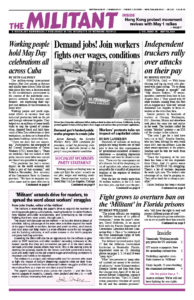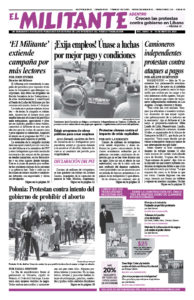The million-strong international workers May Day parade in Havana and similar ones across Cuba did not take place this year, a decision made by the revolutionary government in the context of the worldwide coronavirus outbreak. But workers and farmers are expressing their support and defense of the revolution in many ways.
Working people and youth organized efforts to increase food and industrial production both on the job and through volunteer brigades. They helped out on millions of home health visits to stop the spread of coronavirus, donated blood and held thousands of May Day celebrations at their workplaces, on farms or in front of the apartment buildings where they live.
“There are days that are surprising,” Trabajadores, the newspaper of the Central Organization of Cuban Workers (CTC), wrote May 1. “There are workdays that are looked at with pride, because more labor was carried out than it was possible to imagine.”
“The pandemic has had a serious impact on the world economy and Cuba is part of that economy,” said Federico Hernández, first secretary of the Communist Party in Granma province. “We have to organize ourselves more and be more effective in what we do. We already see the impact with the participation and role of our people as part of this immense response.”
Car caravans with their horns blaring, and other workers on bikes, took to the streets for May Day in 13 cities in the province. At many apartment buildings residents stood out front waving Cuban flags, listening to speeches on the meaning of May Day and singing the Cuban national anthem.
Workers, youth step up to challenge
The U.S. rulers have never forgiven working people in Cuba for overturning the U.S.-backed Batista regime in 1959 and replacing it with a workers and farmers government. In the course of the struggle, to build socialism and volunteering to act in solidarity with revolutionary struggles worldwide, Cuba’s working people transformed themselves, taking control of their own destiny. This revolutionary spirit lives today.
To the U.S. rulers’ chagrin, Cuba’s working people and youth are stepping up to meet the challenge of the impact of the worldwide capitalist economic crisis and the more than 60-year U.S. economic war against Cuba’s revolution. Because the island nation has to import some 60% of its food, along with pesticides and fertilizer, workers are helping to boost production.
In Guantánamo province alone the CTC has organized 419 workers into 26 brigades to strengthen agricultural work. Among the brigadistas are construction, education, sports and culture workers.
José Ramón Machado, second secretary of the Central Committee of the Communist Party, is traveling around the island along with Salvador Valdés Mesa, Cuba’s vice president, meeting with small farmers, farmworkers and others to maximize food production.
They are emphasizing “short cycle” crops — such as squash, okra, eggplant and lettuce. This allows at least three harvests from spring to summer. “We have to plant even in between furrows” to take advantage of available land, Machado told farmers and state farm officials in Guantánamo April 30. To substitute for pesticides, “we have to dust off the hoes” for weeding.
Leaders of the CTC and the Communist Party in Ciego de Ávila addressed May Day gatherings at apartment complexes and worksites across the city. These became “tribunes of revolutionary reaffirmation,” Trabajadores reported.
Because of shortages of transportation, workers at the La Bombonera candy factory in Camagüey are “all getting out our bicycles to come to work,” administrator Odalys Palmero Valera told Trabajadores.
Among those on 17 CTC agricultural brigades in Santa Clara province are letter carriers and workers from the Etecsa phone company. “It is us Cubans who have to plant, produce and harvest our own food,” said brigadista Pedro Rodríguez.
Even with strict measures to prevent the spread of coronavirus, including setting up hand-washing stations at factory entrances, many workplaces have met or surpassed their production quotas.
As of May 4 there were 1,685 confirmed cases of COVID-19 in Cuba, but not a single case reported on the job. This is in sharp contrast to the imperialist U.S., where bosses organize production with utter disregard for workers’ safety to squeeze out maximum profit, with hundreds of workers getting infected.
Residents of the Buenos Aires-Bellavista neighborhood of Camagüey, which is under quarantine because of the virus there, cleared a garbage-filled area and turned it into an urban garden for local consumption. They put up a sign “Long live May Day.”
Revolutionary Cuba continues to send health care workers around the world — now more than 2,000 in at least 23 countries — to fight COVID-19.
“I am sure that if the current United States government asks us for assistance to confront COVID-19, Cuba would provide it,” Josefina Vidal, Cuba’s ambassador to Canada, told the Progressive, despite Washington pressuring governments to reject Cuba’s help.
Washington is “trying to divert attention from its own privatized health system, which is not capable of guaranteeing the health of its population in normal times and even less now in the context of the pandemic,” Vidal said. “Health should not be a business, and access to medical care is a human right.”

